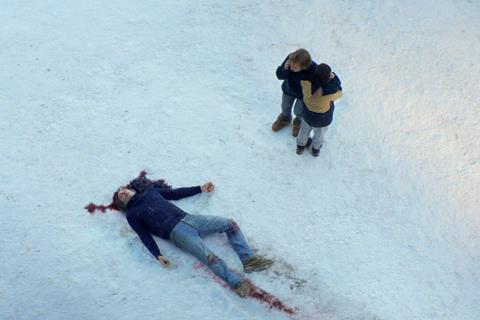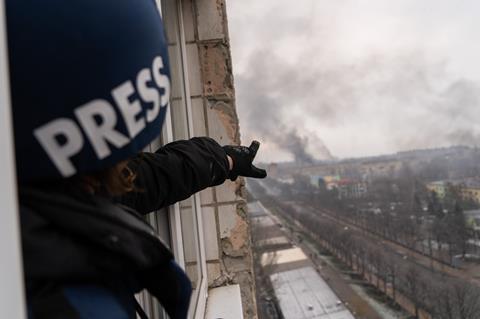
Distribution/exhibition executive, male, Bafta voter
Which British films have impressed you this year? Any high-profile ones that disappointed?
Rye Lane and Scrapper are the independent titles I’ve cherished this year. Both being such vibrant and hopeful debuts was much needed. It sounds stupid that I was impressed by The Zone Of Interest but it’s safe to say I was more than impressed by that. I was disappointed by All Of Us Strangers. The conceit just didn’t hold together for me.
For your other opt-in categories (documentary, animation and/or film not in the English language), which films are so far winning your votes?
For documentaries, Tish is probably the strongest British doc I’ve seen. It’s a bit heavy-handed and very on the nose but probably all the more successful for it. The Deepest Breath is very buzzy but I think it’s too constructed. That’s the definite case for American Symphony also.
We are seeing more celebrity moderators this season, with Cate Blanchett, Andrew Garfield and Jamie Dornan among those to recently host screenings. Does a celebrity host of a Bafta in-person Q&A make a difference to whether you attend?
It makes no difference to me whatsoever. I’m probably an awards publicist’s nightmare.
Producer 1, female, Bafta voter
Which British films have impressed you this year? Any high-profile ones that disappointed?
It’s been an incredible year for British films. All Of Us Strangers is probably my film of the year, and The Zone Of Interest is a hard watch, but I think a masterpiece. We just watched Wonka and it was a smash hit with the kids — presumably its target audience — and it’s great that the industry here can also make high-budget commercial films that feel so uniquely British. There have been a few disappointments for sure — a couple of the higher profile debuts and a few British films that had glitzy cast and director packages but very little buzz about them.

For your other opt-in categories, which films are so far winning your votes?
I’m not opted in to documentary or film not in the English language this year, but the voting system at Bafta feels again very frustrating — in particular, the high number of documentaries that are assigned in the voting groups, many of which feel like TV documentaries. It’s not made clear that voters can only vote for best film, unless they have opted in, which means a huge amount of watching for films that are very unlikely to get best film votes. That said, there are some non-English-language films that will get my votes — including The Zone Of Interest and Anatomy Of A Fall. I also loved Fallen Leaves, but it feels too small to ultimately get into a best film list.
Festival consultant and programmer, female, Bafta voter
Which British films have impressed you this year? Any high-profile ones that disappointed?
How To Have Sex is deserving of all the plaudits. It’s an impressive debut and reminds me of Fish Tank, not only in the way it navigates knotty questions around desire, consent and sexuality with nuance and assurance, but it also heralds the arrival of a fully formed filmmaker.
I was also impressed by Femme. We don’t generally do genre that well in the UK, so it’s been exciting to see so many debuts in this space in recent years. George MacKay is the best I’ve seen him and Nathan Stewart-Jarrett is outstanding. I also really liked Ballywalter – a film that slipped under the radar but that has real soul and sensitivity. Saltburn didn’t work for me, sadly.
For your other opt-in categories, which films are so far winning your votes?
I still can’t get over Anatomy Of A Fall not being the French submission for the best international feature Oscar. For me, it’s the best film of the year. I still haven’t seen The Taste Of Things but I’m finding it hard to work up much enthusiasm for it. That said, I look forward to being proved wrong.
Does a celebrity host of a Bafta in-person Q&A make a difference to whether you attend?
A celebrity moderator makes me less likely to attend, unless it’s a pairing that makes sense or it’s someone I would be interested in hearing in conversation on that particular topic. Otherwise it’s a bit gimmicky — and there’s nothing more excruciating than a badly moderated Q&A. I saw one advertised in Los Angeles that was Spielberg hosting a screening of Killers Of The Flower Moon, with a Scorsese Q&A. I suspect that would have got me out of the house.
Producer 2, male, Bafta voter
Which British films have impressed you this year? Any high-profile ones that disappointed?
There were some fantastic British films this year. Rye Lane was an absolute delight. How To Have Sex was a fantastic debut. Femme blew me away with its mood and daring. I wasn’t as moved by All Of Us Strangers as others were, but I appreciated how well made and acted it was.
For your other opt-in categories, which films are so far winning your votes?
I am opted in for foreign language and for me it’s Anatomy Of A Fall, which I think is the best film of the year. It starts as a traditional procedural and becomes something so fascinating and enthralling. It’s rare that I feel so excited by a film. Sandra Hüller’s performance in Anatomy is so commanding, so nuanced, so full of ambiguity and intelligence — I doubt there is better work this year.

Does a celebrity host of a Bafta in-person Q&A make a difference to whether you attend?
I am not a fan of Q&As in general, especially when there are too many participants. I try to avoid them if I feel I’m going to be sold to, so the fact that a celebrity is moderating doesn’t make much difference.
Producer 3, female, Bafta voter
Which British films have impressed you this year? Any high-profile ones that disappointed?
The Zone Of Interest is chilling and flawless. The Kitchen is a robust debut, elevating the domestic story beyond social realism into a visceral, thrilling experience. The End We Start From struggled to connect with the apocalypse genre. Saltburn seems designed for the American market — folks looking for Downton Abbey with a twist. Hard to imagine Brits putting up with the caricatures, as it doesn’t deliver as a satire.
For your other opt-in categories, which films are so far winning your votes?
In documentary, several titles broaden the diversity conversation by putting a contemporary lens on subjects that may have been approached differently even five years ago. Everything from Little Richard: I Am Everything, which explores his defiant attitude towards race and sexuality, while still shaping who he was; Name Me Lawand, which is a positive refugee story about a deaf child; and Is There Anybody Out There? and Still: A Michael J. Fox Movie, for their no-holds-barred take on disability.
Smoke Sauna Sisterhood is so intimate and surprising, and 20 Days In Mariupol is surely a frontrunner for top prizes. It has an immediacy that is deepened by seeing how the news pieces were captured. The horror is magnified as it expands, but the film keeps the war and the victims front and centre, without glamorising the journalists and their work.
In film not in English language, The Zone Of Interest, Anatomy Of A Fall, Totem, Godland and Four Daughters are all immersive cinema, with exquisite, detailed story worlds. The lead performance was all over the place in Return To Seoul – she’s not an actress, and it shows.
Does a celebrity host of a Bafta in-person Q&A make a difference to whether you attend?
Q&As hosted by filmmakers can be exciting, because they are thinking about the choices made on the frontline. Although not strictly a Q&A, Edgar Wright’s interview with Martin Scorsese at BFI London Film Festival was inspiring. He put the work in, drawing out fresh insights and embracing the energy in the room.
Distribution and marketing consultant, male, Bafta voter
Which British films have impressed you this year? Any high-profile ones that disappointed?
Two that I’ve particularly liked are Femme and Scrapper. In Femme, you seldom feel sympathy for the principal characters, and yet directors Sam H Freeman and Ng Choon Ping manage to keep us engaged in the unpleasantness of it all. And in Scrapper, what a charmer Lola Campbell is — you’re glued to her presence and the growing bond with young dad Harris Dickinson. A great debut feature from Charlotte Regan featuring the most endearing acting duet of the season.
I was less impressed by The Eternal Daughter – an overlong family drama – and [the British-qualifying] Napoleon, which depicts the Napoleon-Josephine love story as if it was a Kardashian reality series.
For your other opt-in categories, which films are so far winning your votes?
In documentary, 20 Days In Mariupol — I’ve not met anyone among Bafta peers who took the time to watch this harrowing film who was not affected by the horror of what is happening there to this day. Queendom’s portrait of Russian trans performance artist Gena Marvin gets my vote for quietly and diligently confronting the oppression she’s facing. Mad About The Boy: The Noel Coward Story was very enjoyable.

In film not in the English language, Agnieszka Holland shows she still has it with Green Border, a film that arrived at the right moment to contribute to the downfall of a notorious political party [Poland’s populist Law and Justice party, which was swept out of power after an eight-year administration in early December].
Producer 4, female, Bafta voter
Which British films have impressed you this year? Any high-profile ones that disappointed?
I admire the storytelling and craftsmanship of All Of Us Strangers. Every frame of this film exudes intentionality. It’s definitely a hard watch but one that did resonate with me on a profound level. I also loved How To Have Sex. Molly Manning Walker balances tenderness with severity and rawness and navigates these sensibilities delicately and admirably. No small feat, especially for a debut director.
For your other opt-in categories, which films are so far winning your votes?
I was captivated by the poignancy of Four Daughters by Kaouther Ben Hania. The filmmaker’s approach not only shed light on the harrowing events leading to family separation but also provided a space for genuine healing for the real-life subjects.
Anatomy Of A Fall is one of my absolute faves so far – a compelling exploration of marriage and gender dynamics, fantastically directed and scripted by Justine Triet. Sandra Huller’s nuanced portrayal of a woman who invites our suspicion and at the same time is completely relatable adds layers to the courtroom drama.







![The Brightest SunScreen[Courtesy HKIFF]](https://d1nslcd7m2225b.cloudfront.net/Pictures/274x183/3/5/0/1448350_thebrightestsunscreencourtesyhkiff_312678.jpg)

















No comments yet